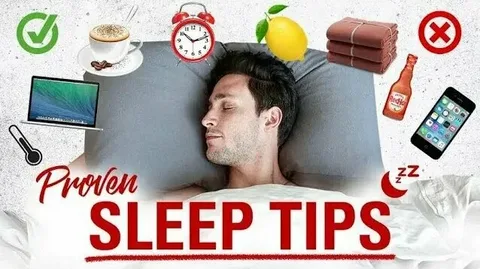Sleep is essential for physical and mental well-being, yet many of us struggle to fall asleep quickly. Insomnia and other sleep issues are increasingly common in today’s fast-paced world. However, adopting the right strategies can help you drift off faster and enjoy restful sleep. Here are seven effective tips to help you fall asleep quickly.
1. Stick to a Consistent Sleep Schedule
Your body has an internal clock, the circadian rhythm, regulating sleep. Going to bed and waking up simultaneously every day helps this clock function properly. Over time, this consistency trains your body to expect sleep at a particular hour, making it easier to fall asleep quickly. Avoid disrupting this rhythm, even on weekends.
Action Tip: Set an alarm to wake up and remind yourself when to start winding down for bed.
2. Create a Relaxing Bedtime Routine
Developing a calming pre-sleep routine signals your body that it’s time to wind down. Activities like reading a book, taking a warm bath, or practicing mindfulness can be highly effective. Avoid stimulating activities such as watching TV or scrolling through your phone, as they can delay sleep onset.
Action Tip: Spend at least 30 minutes before bed doing a relaxing activity in dim lighting.
3. Limit Exposure to Blue Light
Electronic devices emit blue light, which can interfere with your body’s production of melatonin, the hormone responsible for sleep. Reducing screen time in the evening or using blue light filters can help minimize this effect.
Action Tip: Consider using apps or glasses that block blue light, and aim to power down devices at least an hour before bed.
4. Optimize Your Sleep Environment
Your bedroom should be a sanctuary for sleep. Factors such as room temperature, noise levels, and lighting play a critical role in how quickly you fall asleep. A cool, quiet, and dark environment is ideal for promoting restful sleep.
Action Tip: Use blackout curtains, a white noise machine, and adjust the thermostat to around 65°F (18°C).
5. Watch What You Eat and Drink
Your evening diet can significantly impact your ability to fall asleep. Heavy meals, caffeine, and alcohol close to bedtime can disrupt sleep. Opt for light, sleep-inducing snacks like a banana or a small handful of nuts if you’re hungry before bed.
Action Tip: Avoid caffeine after 2 PM, and limit alcohol consumption in the evening.
6. Practice Relaxation Techniques
Relaxation methods such as deep breathing, meditation, and progressive muscle relaxation can help calm your mind and body. These techniques are particularly useful for individuals whose racing thoughts keep them awake.
Action Tip: Try the 4-7-8 breathing method: inhale for 4 seconds, hold for 7 seconds, and exhale for 8 seconds.
7. Avoid Clock Watching
Constantly checking the time can increase anxiety about not falling asleep. This stress often exacerbates insomnia. Instead, turn your alarm clock away from view to remove the temptation to check the time.
Action Tip: Focus on how relaxed you feel rather than worrying about how much sleep you’re getting.
Bonus Tip: Get Out of Bed if You Can’t Sleep
If you find yourself tossing and turning for more than 20 minutes, get up and engage in a quiet, non-stimulating activity until you feel sleepy. This prevents your brain from associating your bed with wakefulness.
Action Tip: Keep the lights dim and avoid screens during this time.
By incorporating these tips into your routine, you can significantly improve your ability to fall asleep quickly. Consistency and patience are key—over time, your body will respond positively to these changes, allowing you to enjoy deeper, more restorative sleep.





